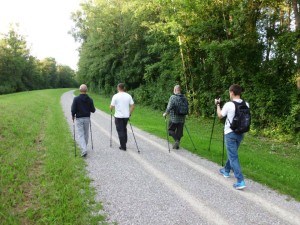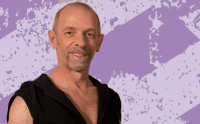A friend, a good friend ... People who have a strong social environment are proven to have fewer mental health problems. Franz proves this impressively with his self-help group MännerXundheit.

The kitchen at the AWO Centre for AIDS Work Swabia in Augsburg is a hive of activity. The pots are bubbling, plates are clattering, cutlery and glasses are clinking against each other. Almost all the members of the Self-help group MännerXundheit are there preparing their meal together. "It's always busiest when we're cooking," explains Franz. "But there's never a dull moment here either." What that means becomes clear when you look at the group's other programme: They meet every Tuesday to go bowling, swimming, to the cinema - or to cook together. The group also regularly goes on trips to Munich, for example to the Oktoberfest or to interesting events and lectures at the SUB, the gay culture and communication centre, or at other prevention facilities
The 16 participants - gay HIV-positive men aged between 26 and 76, with and without partners - have one thing in common: they all withdrew at a certain point in their lives and are now looking to reconnect, albeit in a protected environment. The regular group evenings are so important to the participants that 90 per cent of them come regularly. The initial situation of the men is diverse. Depression, fear of crowds, anxiety about the future or relationships: many don't want to be in a situation where they have to tell someone about themselves and their status. "Some had already forgotten how to live freely for themselves. In the group, they now realise that there is another way."
It's always very sociable, especially at mealtimes. (Photo: F. Stockmeier)Franz knows from his own experience how important social contacts are. He was in a really bad way in the mid-90s. He had already been HIV-positive for ten years by then, and he had developed full-blown AIDS: his helper cells had dropped to 40 and his viral load was 1.8 million. "The doctors had given me another year," says the now 56-year-old. The triple combination saved him and his will to live returned. "I'm just a stand-up guy. I couldn't accept that that was all there was to it." He began volunteering at the AWO centre. His then new partner Helmut, with whom he is still together today, also gave him strength.
Helmut set up the MännerXundheit group two years ago. Franz accompanies him as often as he can and can contribute a lot from his own rich experience - and provide inspiration on how to move forward despite the crisis. "Before I got myself together, I'd been through pretty much everything you can experience as a positive person," says Franz. "It also took me a while for all the scars to heal."
The voluntary work in the group, which he does alongside his part-time job as a consultant for social and pension law at the AWO centre, gives him deep satisfaction: "I like being there for someone - when I see that they can do something with it." He also focusses on practical support in his group work: "It's important that there are several options, for example going swimming, doing yoga or going on excursions. That way, each of the men can choose what is feasible for them." Nobody is "worked on", pressure is avoided.
Get out and experience something: for example at the Munich Oktoberfest. (Photo: F. Stockmeier)Of course, there is also the opportunity to discuss problems. Above all, however, the aim is to enable access to life again, with and through activities in the group. The participants gradually thaw out and dare to socialise again. And they become active again themselves, networking with each other.
Like Martin*, a very young guy who totally hid away, says Franz. But at some point he did join the group, even though he was very reserved. A few months later, he joined the group for the first time - with a really dirty joke. Everyone was gobsmacked at first. Today, Martin is actively involved. When Franz asks him if he can pick up another participant or take over the organisation of one of the group excursions, Martin is happy to do so. Sure, he sometimes has days when he wants to withdraw. "But we all have them," says Franz. "We're there when we're asked. It's almost like a family. Our regular meetings have built up a deep sense of trust and understanding for each other.










